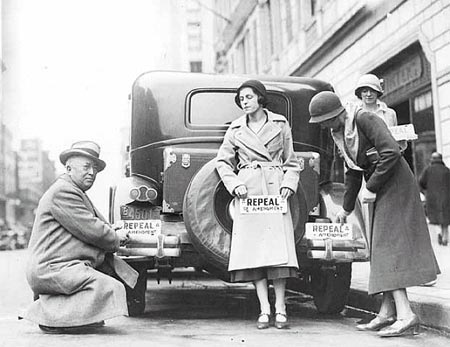1920s The World of the Bootlegger
Officer guards liquor seized from raid in Camden, New Jersey. 1920
Most of the bootleggers from the Philadelphia Delaware Valley were born
around the turn of the twentieth century to immigrant parents, primarily
of Eastern European Jewish extraction, but also of Italian, Polish, or
Irish origin.
They were largely uneducated and unskilled.
Their education came on the streets, where they engaged in
rough-and-tumble vocations as youths before carving a niche in the
perilous, but potentially lucrative, illegal alcohol rackets.
Many also had interests in gambling, and to a lesser extent, drug
distribution and prostitution ventures.
Many had histories of committing increasingly violent crimes, while
others had pretensions to establishing careers as respectable
businessmen.
In the Philadelphia area, in particular, there were close ties between
the worlds of prize fighting and bootlegging.
Bootleggers often spent their money as quickly as they made it.
They were fixtures at important sporting events, the theater, the race
track, and gambling houses throughout the country.
Nevertheless, the most successful bootleggers usually channeled money
into legal investments.
Most of the prominent bootleggers were plagued by tax evasion charges,
and many were pursued by the government for unpaid taxes well after
prohibition ended.
Violence was a fact of life in bootlegging. In the Philadelphia Delaware Valley area, waves of racketeer murders were particularly prominent in 1922, 1925, 1928, 1930, and 1932, and continued well beyond Prohibition. The violence obscures a remarkable facet of bootlegging operations: cooperation among racketeers, retailers, and authorities. Investigations uncovered a complex network of police graft and official protection of racketeers' manufacturing, warehousing, distribution, and retailing interests. The use of violence to settle disputes was actually secondary to that of monetary negotiations, both legal and illegal. The unskilled youths from humble backgrounds developed no small level of business acumen to accompany their street savvy. Perhaps that is why bootleggers continued to dominate the rackets after prohibition ended, moving into numbers and casino gambling, untaxed liquor, union racketeering, and other illegal enterprises, as well as the legal liquor distilling business.
http://exhibitions.library.temple.edu/exhibits/prohibition/bootlegging.jsp


